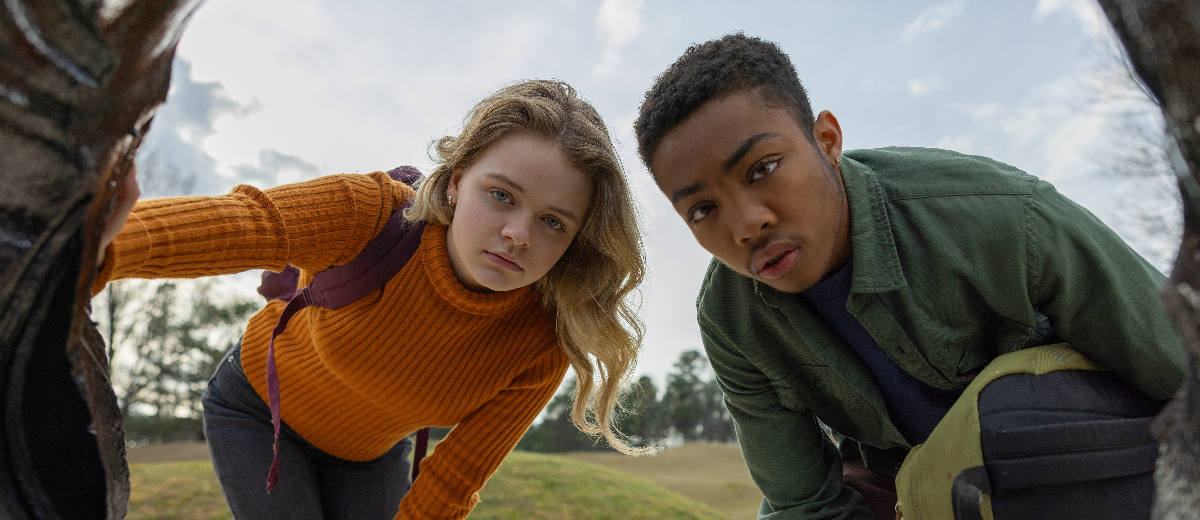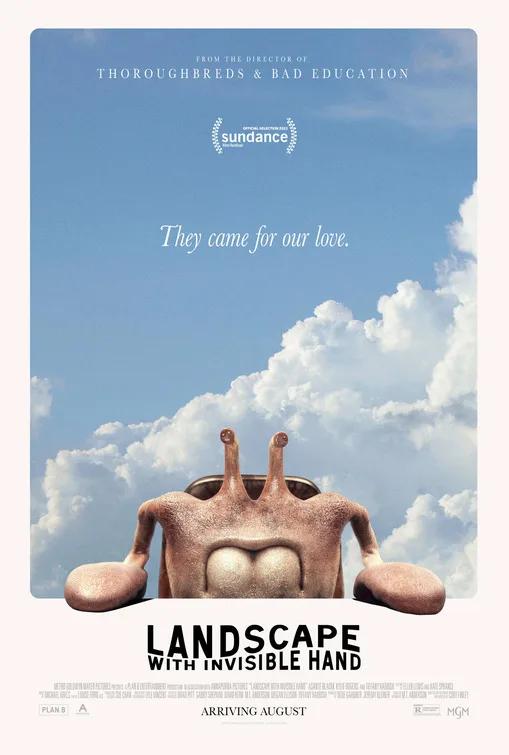It’s 2036 AD, and space aliens have not only landed on Earth, but also maybe forever changed the economy, too. That’s the main premise of “Landscape with Invisible Hand,” a satirical sci-fi comedy based on M.T. Anderson’s award-winning young adult sci-fi novel. Adapted and directed by Cory Finley (“Thoroughbreds,” “Bad Education”), “Landscape with Invisible Hand” expands the plot and core relationships of Anderson’s novel, which follows an aspiring teen painter and his family as they struggle to make enough money to keep their family home.
Some of Finley’s tweaks and twists stand out, especially how some characters wallow and even weaponize their financial distress as a self-soothing coping strategy. Unfortunately, “Landscape with Invisible Hand” still relies too much on basic and by-now trite ideas about making money and staying human under otherwise degrading living conditions. Finley’s E.T.s are clearly meant to reveal how small and/or resilient humanity can be when faced with even fewer ways to survive, but they ultimately seem more like a fanciful plot device than a thoughtful extension of the world outside the movie theater.
The setup’s good enough: the Vuvv have been observing our planet since the 1950s but have kept their distance out of fear of being shunned like any other outsiders. Now they’re here and have already been welcomed by rapacious businessmen and their newly jobless subordinates. The Vuvv, whom one character describes as “gooey” sentient coffee tables, have advanced technology but lack empathy. Soon everyone on Earth works for them, either as hired help or entertainment. The Vuvv like retrograde 1950s sitcoms because they like the idea of people more than the reality. Go figure.
Adam Campbell (Asante Blackk), a teenage artist, mostly keeps to himself but still becomes involved with the Vuvv after he invites fellow high-schooler Chloe Marsh (Kylie Rogers) to stay in his family’s basement. At first, Adam’s mom Beth (Tiffany Haddish), resists this new living situation, but she tentatively warms up to Chloe’s apologetic dad (Josh Hamilton) and surly older son Hunter (Michael Gandolfini) once Mr. Marsh starts paying rent. Chloe also chips in, but she does it by recording a live “courtship broadcast” video stream with Adam, which they tape and upload for the Vuvv using data-recording monitors called nodes. The Vuvv pay to watch Adam and Chloe hold hands and neck with each other, which understandably estranges the young lovers. Then the Vuvv sue Chloe and Adam for false advertising, since their livestream is called “Adam and Chloe in Love,” so they have to figure out an alternative living/money-making arrangement.
Much of “Landscape with Invisible Hand” sets up ideas that are either negligibly developed or carefully avoided. The Marshes’ resentment towards the Campbells provides the greatest source of tension since Mr. Marsh resents Mrs. Campbell for having opportunities he and his son crave. Hunter’s pouting is sometimes amusing, though a later scene where he shaves off his eyebrows to make himself look more appealing to the Vuvv doesn’t go far enough. It’s also disappointing to see not much made of an early scene where Chloe shoos away a broke classmate (Christian Adam) by telling him that he’s scaring away her other customers. His sullen retort—“What other customers?”—is funnier and more to the point than anything else in “Landscape with Invisible Hand.”
The Campbell family, including Adam’s sister Natalie (Brooklynn MacKinzie), also don’t have much of an emotional life beyond their discomfort with the Vuvv. That’s partly by design, though the movie’s brisk pace and bracing close-ups suggest that Finley’s too invested in keeping viewers at arm’s length. There’s even a pseudo-Spielbergian scene involving Adam’s dad that explains why there’s no love left in the Campbell home. That’s a provocative concept, but it’s not developed beyond a point. Instead, Haddish gets a tidy little speech in which she tells off one of the Vuvv, and then the movie shifts focus yet again so that it’s about Adam, the frustrated painter. That plot thread predictably does not end well for Adam, though he still gets to walk away without much dramatic fallout or urgency.
You can see much of what’s wanting in “Landscape with Invisible Hand” in the scenes that revolve around the Vuvv. They’re weird-looking and quirky, but they don’t do or suggest much beyond what we already know. The rich don’t need to like or even care about you, not as long as they can pay you. That’s about as meaningful as “Landscape with Invisible Hand” gets, which is unfortunate given how much time is spent on endlessly restating the skewed terms and conditions of Adam’s perpetually complicated life story. Finley deserves credit for adding extra wrinkles to Anderson’s story, but “Landscape with Invisible Hand” doesn’t cut deep enough to leave a mark.
Now playing in theaters.




















